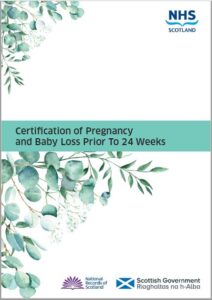After the loss
At some stage in this very difficult time, you are likely to be asked to decide about having a burial or cremation for your baby. We talk about this below – and we also share some thoughts about making memories and marking your loss.
When a baby dies before 24 weeks of pregnancy, there is no legal requirement to have a burial or cremation. However, your hospital may offer to arrange for your baby to be buried or cremated or you may decide to arrange this yourself.
The hospital staff should give you time to think about what you want to do. You may feel too shocked to be able to make a decision right away. This is a decision you probably never imagined that you would have to make.
Hospital arrangements
Hospital policies around burial and cremation differ. Your hospital may offer to arrange an individual burial or cremation for your baby, or they may offer collective burial or cremation of a number of babies.
In all cases the hospital staff should take time to explain to you what the hospital offers. They should give you written information as well, so that you can read and think about it after you go home.
The bereavement unit at the hospital talked through all of these decisions with me, and contacted a friend to come into the hospital to be present for the discussions as well. They discussed the decisions with me sensitively and allowed me time to think through, and came back to discussions more than once if I requested.
You may want to ask staff to keep your baby until you are ready to decide. They will let you know if there is any limit to the time you have for this, and what they do if they don’t hear from you by then.
They should also understand if you feel you cannot make a decision at all.
I had to make decisions beyond my wildest dreams. Did I want to cremate or bury the babies? I was making funeral arrangements when all I wanted to do was to hold them in my arms and take them home forever.
Making your own arrangements
You can make your own arrangements for a funeral and/or burial or cremation if you prefer. You could talk to a funeral director or a minister of your own faith if you have one.
I was amazed by how helpful and sensitive the funeral directors were in organising my baby’s burial.
The hospital chaplaincy or spiritual care team may also be a good source of information, advice and support, even if you don’t have any religious beliefs.
The hospital chaplain was also amazing. The cremation was organised by the hospital but she regularly kept in contact even before Olivia was returned from her post mortem, letting us know all the options we had etc. She made a beautiful order of service and was very caring.
You might decide that you want to bury your baby yourself, perhaps at home. There are guidelines about how and where this can be done, and you can get more information by contacting us at the Miscarriage Association or by contacting the charity Sands.
We made a little garden of remembrance in our garden and planted a raspberry bush and just buried the baby there (in a little box).
Making memories and marking your loss
Whether or not you have a funeral for your baby, you may feel you want to find other ways to mark his or her brief life.
I sowed Viola heartsease seeds all on their own in a pot and when they flowered, they were so small and perfect – a fitting reminder of my loss.
It may be important to you to name your baby. If you do not know whether your baby was a boy or a girl, you could choose a name that could be given to either.
Some parents gather mementos in an album or a special box, for example:
- a scan photo
- photos of their baby
- hand and footprints, if these were possible
- a hospital bracelet
- letters or cards
- something they had ready for their baby.
Some hospitals have memory boxes for people to use, from organisations such as Simba Charity and 4Louis.
Other parents mark their loss in different ways, perhaps planting a shrub or tree, making a donation to charity, or creating something else in their baby’s memory. Many light a candle on special days, such as the anniversary of their loss, their baby’s due date or during Baby Loss Awareness Week (9-15 October).
Your hospital may have a book of remembrance where you can enter your baby’s name and the date of your loss. Some hospitals hold regular remembrance services for babies who died during pregnancy or around birth.
Many parents create messages for or about their babies through the Miscarriage Association’s Stars of Remembrance webpage. And others buy, make or plant something special in remembrance of their baby.
A couple of weeks after I miscarried, we bought two plants and planted them in the garden with a pebble pond and pear tree in memory of our little one.
Can I have a certificate for my baby?
Sadly, there is no official registration of babies lost before 24 weeks of pregnancy.
However, in Scotland you can apply to record your loss in a special Memorial Book and to receive a certificate of loss. 
In England, you can apply for a certificate of loss if you live in England and your loss was in England.
We very much hope that Northern Ireland and Wales will also offer certification of pre-24 week losses soon.
In the meantime, some hospitals will give you a certificate in memory of your baby. This might include your baby’s name, if you have chosen one, the date of the loss and perhaps some other details. It would not be a legal document, in the way that a stillbirth certificate or death certificate is, but it may still be important to you to have this recognition from your hospital. If they don’t offer it, you can ask:
- a nurse or midwife on the ward
- the hospital chaplain
- the bereavement office
We can provide information and guidance for hospitals wanting to provide a certificate, which you can find here.
We have also created a selection of memorial certificates which you can choose from.
Available from our online shop, the certificates will arrive blank for you to be able to personalise with whatever details you wish.
On the next pages, we talk about


